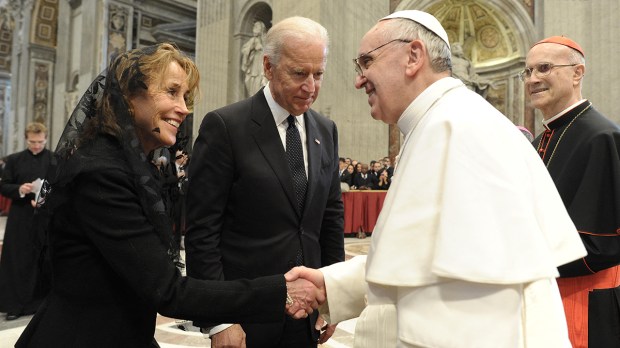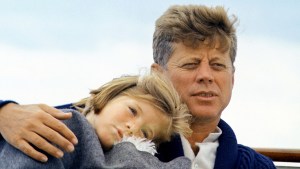Then-Senator John F. Kennedy’s Catholic faith was notoriously controversial during the election of 1960. A liberal intelligentsia criticized Kennedy for the Church’s views on birth control and economics, while old-fashioned fundamentalists attacked the papacy and Catholic worship.
Against this backdrop—while campaigning for office in 1960—John F. Kennedy gave a major speech in Houston, Texas. Before hundreds of Protestant ministers, he outlined his views on his Catholic faith, faith in public office, and the nature of religion in the United States at large.
In the speech, Kennedy famously declared, “I am not the Catholic candidate for president. I am the Democratic Party’s candidate for president, who happens also to be a Catholic. I do not speak for my church on public matters, and the church does not speak for me.” In the same speech he promised to govern according to “what my conscience tells me to be the national interest.” He strongly disavowed any idea that he would be swayed by any religious authority or directed by his religious faith in matters of public policy.
All this makes it much more interesting that Kennedy was also the first Catholic president—and only the third sitting American president in history—to meet the pope.
The death of John XXIII
Just one month before Kennedy’s planned visit to Italy, to include a trip to the Vatican, Pope John XXIII suddenly died on June 3, 1963. John XXIII had intended to present Kennedy with a signed copy of his encyclical, Pacem in Terris, which was posthumously delivered to the president by Boston’s own Cardinal Cushing. The pontiff’s death, though, interrupted the work of the Second Vatican Council and threw the president’s tour abroad into uncertainty.
Paul VI was duly elected on June 21, just three weeks after his predecessor’s passing, and agreed to meet President Kennedy. Kennedy, out of respect for the coronation events of the new pontiff, debated canceling the trip altogether. In the end, it was decided that the president would land in Milan and then proceed to Rome, where he would be received by the new pope.
Protocols and more
Once the meeting was confirmed, other questions loomed. Would Kennedy observe the traditional protocol, kneeling and kissing the pope’s ring? Would the audience be held in a foreign language? The questions were not merely matters of observing the proper protocols, since Kennedy’s political enemies would have a field day with photographs of the President of the United States kneeling before Rome’s Supreme Pontiff.
Paul VI solved all these questions, since, when Kennedy approached he warmly greeted the President, extending his hand offering a cordial handshake.
The Holy Father later highlighted the positive nature of the meeting, saying, “We received the official visit of the President of the United States of America John F. Kennedy on July 2, 1963, a few days after our election to the Roman Pontificate; and this special circumstance contributed to giving our spirit a profound impression off that meeting, and gave us great hope for our new apostolic ministry upon making this contact with the most exalted and most significant representatives of the world.”
Paul VI’s positive impression of President Kennedy included his appreciation for Kennedy’s inaugural address (“It was a masterpiece”), Kennedy’s “capacity to speak to modern society in concrete terms,” and his “modest and courteous” manner during their meeting.
A changing world
Since President Kennedy was welcomed to the Vatican, the United States has been transformed, particularly by divergences on social issues.
Today’s Catholic American president, President Biden, presides over a nation that has legalized artificial contraception (June 7, 1965) and abortion (January 22, 1973), as well as re-defined the nature of marriage (June 26, 2015). Further, the United States has repeatedly engaged in military action not condoned by the Vatican; both the Vietnam War and the War in Iraq come to mind.
What to expect
So what do we expect from this upcoming meeting with Pope Francis and President Biden? Jen Psaki, the White House press secretary, said the president and pope will discuss common efforts “grounded in respect for fundamental human dignity, including ending the COVID-19 pandemic, tackling the climate crisis and caring for the poor.”
No public address is expected from Pope Francis at the time of the meeting. Whether the Holy Father will raise any aspects of President Biden’s platform that notably diverge from Church teaching remains to be seen.


